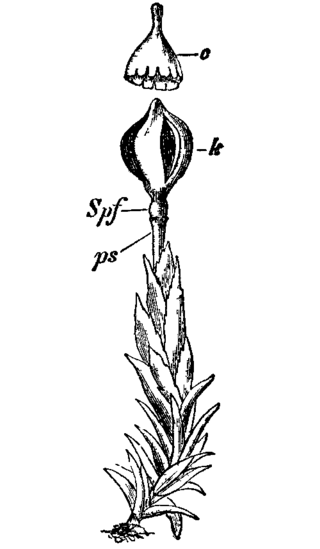
Andreaeaceae is a family of mosses which includes two genera, Andreaea, containing about 100 species, and the genus Acroschisma. The Andreaeaceae prefer rocky habitats ranging from tropical to arctic climates, on which they form tufted colonies, typically with reddish to blackish shoots. The capsules lack the peristome mechanism and dehisce longitudinally to release the spores, resulting in a paper-lantern appearance.
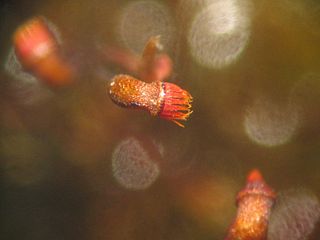
The Bryopsida constitute the largest class of mosses, containing 95% of all moss species. It consists of approximately 11,500 species, common throughout the whole world.

Acritodon is a genus of moss in the family Hypnaceae. It is a monotypic genus only containing the species Acritodon nephophilusAcritodon nephophilus is endemic to Mexico, where it is known only from two locations in the Sierra Madre de Oaxaca of Oaxaca state. Its natural habitat is subtropical or tropical moist lowland forests. It is threatened by habitat loss. Conservation efforts for this species have difficulty protecting local populations due to insufficient attention and legislation regarding preservation of moss species.

Pottiales is an order of mosses in the subclass Dicranidae.

Jaffueliobryum is a genus of moss in family Ptychomitriaceae.
Leucoperichaetium is a genus of moss in family Grimmiaceae.

Andreaeobryum is a genus of moss with a single species Andreaeobryum macrosporum, endemic to Alaska and western Canada. The genus is placed as a separate family, order and class among the mosses.
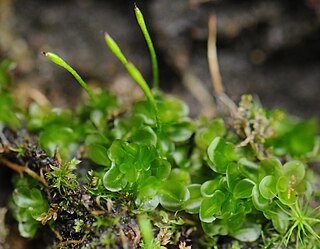
Oedipodium is the only genus of moss in the family Oedipodiaceae. It contains the single species Oedipodium griffithianum, the gouty-moss or Griffith's oedipodium moss. This species is distributed in cooler climates of Eurasia, as well as from Alaska, Washington state, British Columbia, Yukon, Greenland, Newfoundland, Tierra del Fuego and the Falkland Islands.
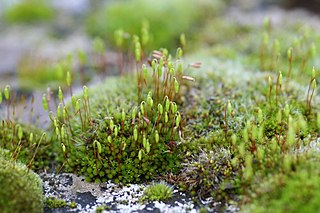
Bryales is an order of mosses.

Timmia is a genus of moss. It is the only genus in the family Timmiaceae and order Timmiales. The genus is named in honor of the 18th-century German botanist Joachim Christian Timm.

Bryaceae is a family of mosses.

Ditrichaceae is a family of haplolepideous mosses (Dicranidae) in the order Dicranales.
Micromitrium is a genus of haplolepideous mosses (Dicranidae) in the monotypic family Micromitriaceae . The genus Micrometrium was previously placed in family Pottiaceae in order Pottiales.
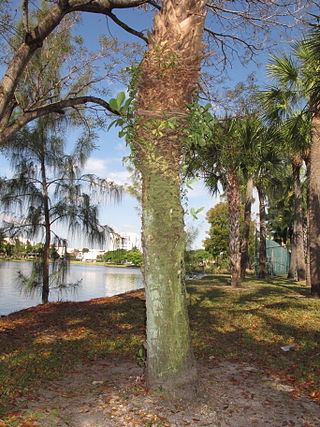
Octoblepharum is a genus of haplolepideous mosses (Dicranidae) in the monotypic family Octoblepharaceae . The genus Octoblepharum was previously placed in family Calymperaceae.

Gigaspermum is a genus of moss in the family Gigaspermaceae. It contains four species.
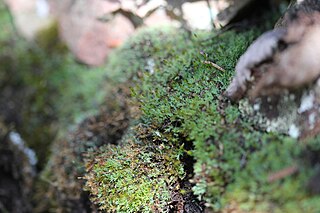
Saelania is a genus of mosses in the monotypic family Saelaniaceae in subclass Dicranidae. The genus was previously placed in family Ditrichaceae. Saelania is named after Finnish botanist Thiodolf Saelan.

Pleurophascum is a genus of haplolepideous mosses (Dicranidae) in the monotypic family Pleurophascaceae in the order Pottiales.
Serpotortella is a genus of haplolepideous mosses (Dicranidae) in the monotypic family Serpotortellaceae in the order Pottiales.
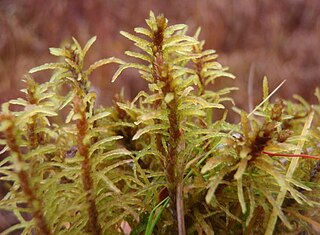
Helodium is a genus of mosses belonging to the family Helodiaceae.

Wijkia extenuata, commonly known as spear moss or spiky wiki, is a species of moss from the family Pylaisiadelphaceae. It can be divided into two varieties Wijkia extenuata '-var. caudata and Wijkia extenuata var. extenuata. It is commonly found throughout the tropical, subtropical, and temperate forests of eastern Australasia and New Zealand.
















